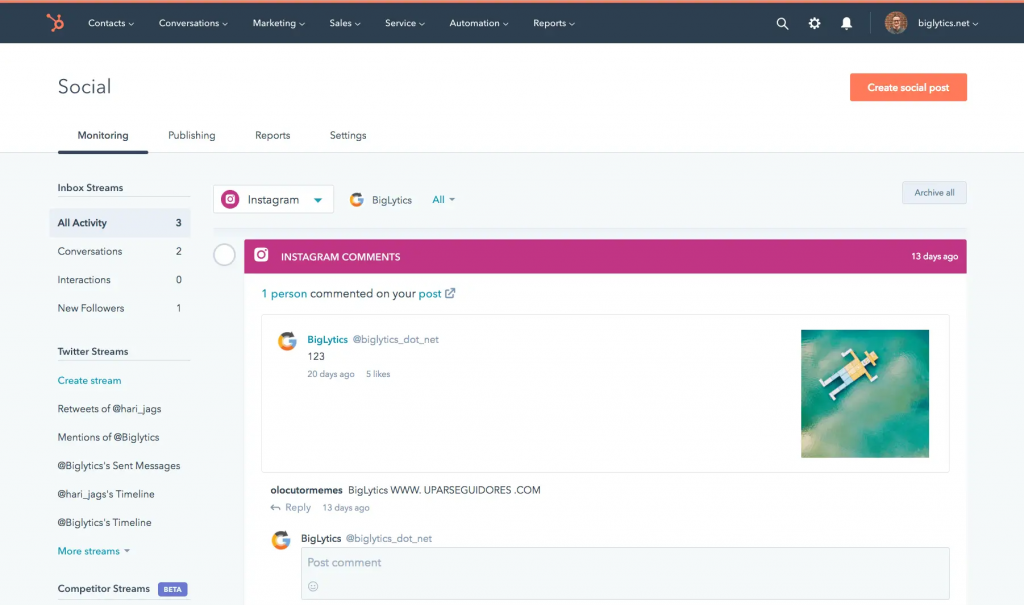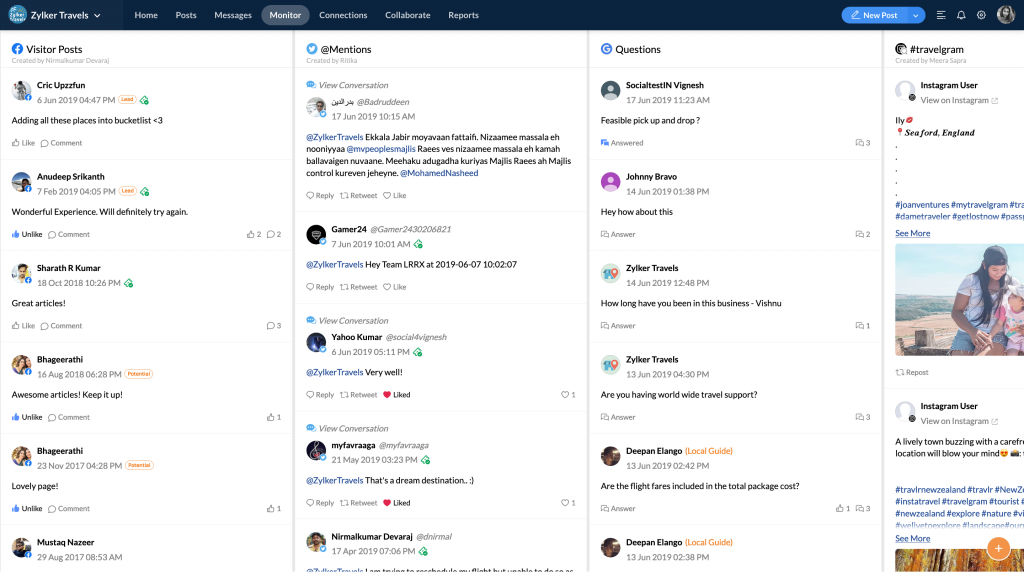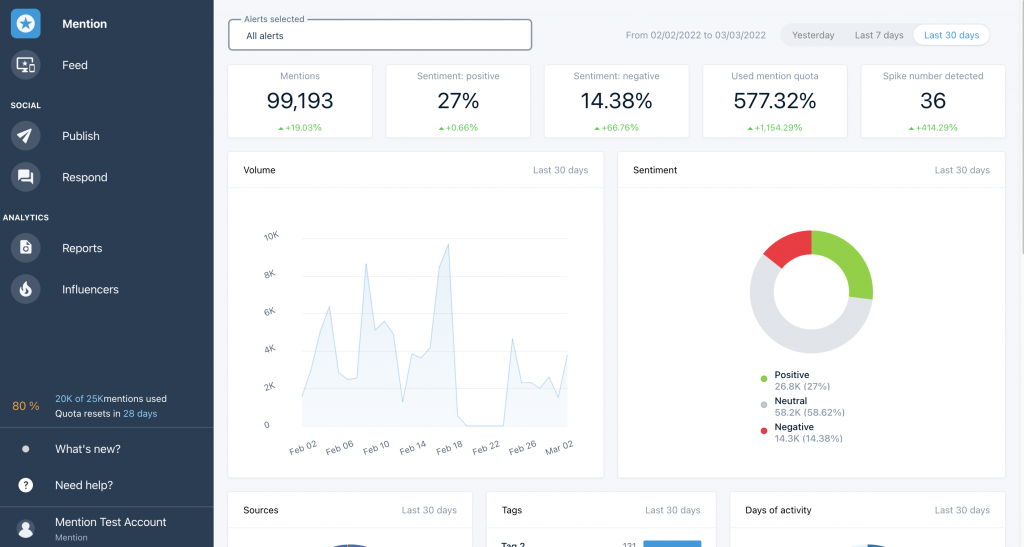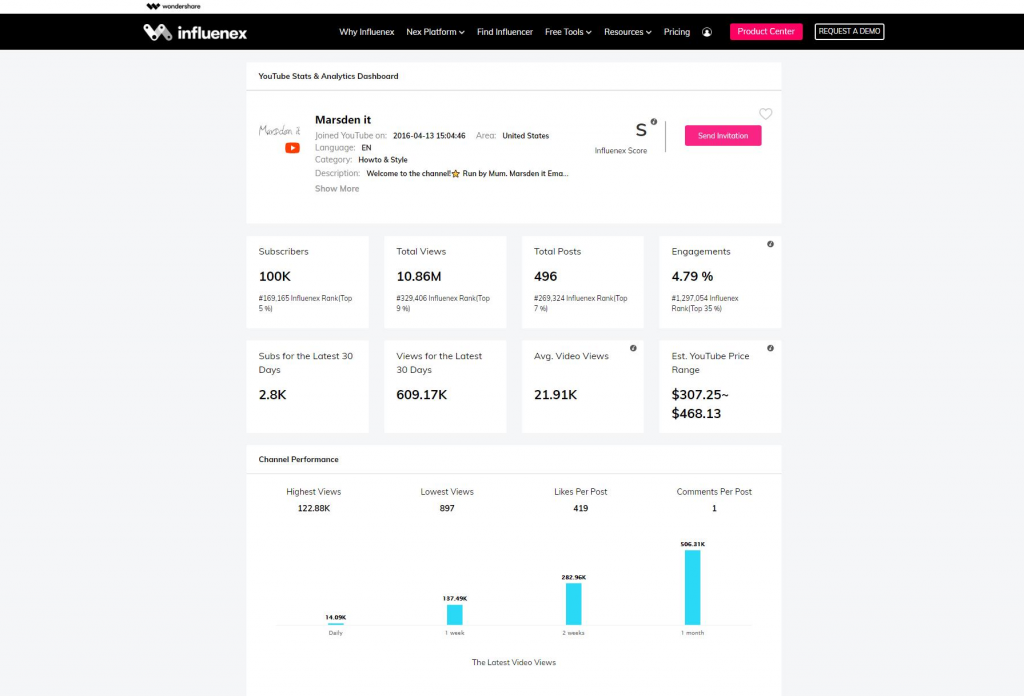These days, social media has become more than just a place for people to make connections, share information, and discuss ideas. For marketers, social media networks like Facebook and Twitter have also turned into valuable resources for gaining insights into consumers’ opinions and behavior. Marketers can also use various social media platforms to do market intelligence and competitor research.
Aptly called social media monitoring, such practices can go a long way in boosting customer engagement and improving customer service. Our guide, What is social media monitoring software?, walks you through its uses, along with its benefits and limits. We’ve also included some examples of social media monitoring software to help interested marketers get started.

Detailed Guide on Social Media Monitoring Table of Contents
Social media has infiltrated most aspects of society and culture, and research on social media usage indicates how these networks have invaded users’ lives. The latest statistics, for instance, show that nearly 60% of the world’s population use social media, collectively spending 10 billion hours using these platforms daily.
The top reasons for using social media also indicate that these platforms do more than facilitate connections among friends and family members. Approximately 34% of internet users, for instance, discover new brands, products, and services through social media.
Source: Business2Community
These findings highlight the importance of social media in engaging customers and potentially improving conversion rates. As such, social media monitoring becomes even more useful to businesses of all sizes. The sections below define social media monitoring, its uses, and its limits and explain how the strategy can work for your business.
What is social media monitoring?
Social media monitoring is the process of tracking and responding to conversations about your brand, products, and services on social media platforms. Often, this strategy also involves monitoring your target audience, along with industry leaders and influencers, on major social media networks. Doing so will also make it easier for you to keep tabs on what your target market says about your brand and products.
As you’re looking up “what is social media monitoring,” you may also encounter the concept of social media listening. Some marketing experts use these two terms interchangeably. However, other social media specialists recognize distinctions between the two practices.
Apparently, between the two, social media listening is a broader concept that takes a higher-level perspective on the sentiments of target audiences. Aside from responding to conversations, the practice includes analyzing collected social media data, recognizing trends, and applying insights to improve future social media strategies.
For social media monitoring to be effective, marketers will want to cover popular types of social media, including social networks and social messaging platforms. In some cases, marketers might also want to track review websites and blogs. However, due to audience overlaps, marketers will be able to cover a sizable chunk of their target market just by focusing on one or two of the larger social media platforms.
Source: Oberlo
Why is social media monitoring important?
Social media monitoring provides businesses with a way to collect, analyze, and respond to legitimate customer insights about their brand. These practices also bring several more benefits to businesses, such as:
- Get access to insights from your target market – Marketers can collect accurate data on their target markets’ perception of their brands, products, and services. You can also track indirect mentions of your brand and even monitor competing brands and products to get more insights.
- Provide immediate responses to customers – Since you’ll be able to read conversations as they happen, you can also immediately respond to queries and negative feedback. This prevents issues and pain points from escalating as well.
- Create an image of authenticity for your brand – By responding to customer queries themselves, marketers can also give their brands a more authentic feel and a human touch. This improves a brand’s reputation and even helps create a sense of community among your social media followers.
- Identify and reward brand advocates – Social media monitoring also makes it easier for marketers to identify highly loyal customers who spread positive feedback about your brand. You can reward these brand advocates to encourage them to be even more loyal to your business.
- Collect customer insights more efficiently – You can use social media monitoring tools to automatically gather mentions and conversations on social media platforms where your business is active. This automation also helps you and your social media marketing team save time by avoiding manual data collection.
- Create more effective marketing campaigns – Moreover, with social media monitoring, marketers can learn more about their target audiences. The additional knowledge can help marketers develop and improve their strategies for engaging customers and promoting products and services.
How Much Social Media Influences US Consumers’ Purchase Decisions
Source: Sprout Social
Designed byHow does social media monitoring work?
More than learning the social media monitoring definition, knowing how the strategy works is crucial to effectively adopting it. The good news is that businesses now have the option to use social media monitoring platforms. These tools do the heavy lifting and keep track of your social media audience and their usage of keywords and hashtags.
The first thing you need to do when using social media monitoring systems is to set up a list of keywords or phrases that you want to track on social media. Most of these tools also allow you to exclude certain keywords so you can drill down on results. Likewise, many social media monitoring programs also have the capability to track media such as forums and blogs.
Depending on your goals, some important keywords or phrases to monitor include:
- Your business name or brand name
- Names of your popular products and services
- Variations and misspellings of your brand’s name
- Your slogan or tagline
- Industry or niche-relevant keywords
- Commonly used hashtags in your niche or industry
Once you’ve set up your keywords, these monitoring systems continuously crawl social media platforms to gather the information you need. Depending on the social media platform, the tools may check for relevant mentions multiple times a day. These tools also collect all the relevant comments, mentions, and conversations into one platform for easier viewing and analysis.
Results and Opportunities to Focus On
It may be slightly overwhelming to wade through the results collected by your social media monitoring tool. Depending on your goals, here are some results that you can focus on:
- Sentiment – Customer sentiment is one of the most important results marketers should focus on. Track whether your customers are saying positive or negative things about your brand and products. You can apply such insights to your marketing and customer service efforts and minimize negative sentiments about your business.
- Pain points – You also want to be on the lookout for customers who are posting complaints or problems about your brand, products, or services. These comments and conversations provide businesses with a good opportunity to promptly address customers’ issues and improve customer service levels.
- Questions – Social media monitoring also provides a great opportunity for marketers to answer questions about their products and services. You can even go a bit further and respond to queries about your niche and industry.
- Content – When you track keywords relevant to your niche, you may also come across content that you can share with your target market. You may also discover the types of content and topics that your target audience finds useful.
- Influencers – As you’re sorting through results, you may also come across well-known personalities who you can gain valuable insights from. These influencers, especially if they love your brand and they have a considerable following, may also present potential marketing opportunities for your brand. Nine out of 10 brands today use influencers for their marketing strategies.
What is social media monitoring software?
Social media monitoring software comprises tools used to track and gather relevant brand mentions and conversations across social media networks. Marketing teams typically use these tools to understand customers’ sentiments about their brands, products, and services. Moreover, social media monitoring platforms can be used to identify trends and perform market intelligence research.
Most social media monitoring software are capable of tracking content across major social media networks, such as Facebook and Twitter. Users can also set up the software so it tracks only certain keywords and phrases in social media content. This ensures that social media monitoring tools gather only relevant information. Many of these tools are also capable of supporting multiple languages so marketers can cast a wide net.
With these features, the software can also identify opportunities for providing highly personalized content, improving customer service, and responding to customer queries.
Types of Social Media Monitoring Software
There are various types of social media monitoring software in the market today. Below are some of the most common types used by marketers:
Standalone social media monitoring tools
Marketers today can use tools that are specifically designed for monitoring or tracking social media. Once keywords or phrases are set up, the software then tracks relevant conversations across a wide variety of social networks. The data is then collected on one platform for easy access. For easier analysis of the collected data, the software can apply various filters such as sentiment, social media network, and demographics. In this way, marketers can easily choose insights to use in future campaigns.
Integrated or comprehensive marketing programs
In many cases, a social media monitoring tool also comes integrated as one of the core features of a larger program. These comprehensive systems often offer various features for creating digital marketing strategies, generating leads, and analyzing marketing data.
Review tools
Sometimes, social media monitoring software also come in the form of review tools. These tools scan the Internet for reviews of your business and collect these reviews into an organized list. This makes it easier for you to spot and respond to negative feedback about your brand, if necessary. Responding to negative reviews can also help you retain your customers.
Lead generation tools
Aside from monitoring your brand’s mentions on social media, lead generation tools offer the extra feature of identifying potential leads. These tools can scan your brand’s interactions on social media to pick up on potential leads and spot consumers who are talking about your brand the most. You can then interact with these consumers to turn them into loyal customers and brand advocates.

Hubspot Marketing comes with a Social Inbox that collects relevant mentions, conversations, and interactions.
Features of Social Media Monitoring Software
Though you won’t find a shortage of social media monitoring software these days, all these programs have some common features. Below, we’ve listed some important features of social media monitoring software to look out for.
Social network monitoring
A core feature of these tools, social network monitoring allows users to automatically and simultaneously track conversations across different social networks. The conversations are then collected in a centralized location, which ensures organization and easy access. This feature comes in handy for businesses that want to monitor various keywords over multiple social media networks.
Sentiment scoring
In addition to tracking mentions and conversations about your brand and business, many social media monitoring tools also offer sentiment scoring. This refers to the ability to determine if the sentiment behind brand mentions is neutral, positive, or negative. This feature can help monitor the performance of products, services, and even marketing campaigns.
Identifying brand advocates
As a social media monitoring tool tracks conversations about your brand, you’re also likely to come across people who contribute the most to these conversations. You can look into these individuals and the size of their following to see if they can work as brand advocates for your business. These brand advocates can significantly help in improving your brand’s reputation among consumers.
Analytics
Most social media monitoring software also comes with analytics capabilities. This feature helps marketers identify and analyze trends and patterns during data analysis. Through analytics, businesses can also accurately measure marketing campaigns’ performance in terms of metrics such as engagement rates.
Reporting
Similarly, many social media monitoring programs also offer a reporting feature. This feature provides access to commonly used and customized reports and dashboards that measure metrics important to your business. By transforming data into graphs and charts, these reports make it easier for marketers to understand and present data if needed.
Post publishing
Moreover, if a social media monitoring tool is integrated into a larger social media management platform, chances are you’ll also be able to publish social media posts from the software. Marketers can also auto-schedule social media posts, even months into the future. This feature helps marketers save time and effort on manual tasks and focus their efforts on boosting conversion rates.

Zoho Social also gathers relevant mentions and conversations into a single monitoring dashboard for easy access.
Benefits of Social Media Monitoring Software
Social media monitoring tools can magnify the efforts of your business’ marketing and social media teams. Here are some of the most important benefits of using social media monitoring software.
Automation
One major benefit of using social media monitoring tools is that these programs automate the task of tracking multiple social media networks. This automation helps marketers save a significant amount of time and effort, especially since certain social networks have to be checked multiple times a day to ensure accurate tracking. In this way, marketing professionals also get to focus on more important, value-adding tasks like creating effective marketing campaigns and improving conversion rates.
Accurate data tracking
Manual social media monitoring tends to be prone to human error, like all other manual tasks. Since these tools are automated, social media monitoring software accurately tracks and captures relevant brand mentions and conversations. This accuracy ensures that marketers get high-quality, reliable data that they can use to gain insights into consumer opinions.
More effective marketing campaigns
Social media monitoring tools can also help marketers refine existing campaigns and create campaigns that ultimately resonate more with consumers. By tracking consumer conversations, these tools provide valuable insights into what customers think of your brand, products and services, and business in general. These insights can go a long way in helping marketers tweak their campaigns and get better results for their efforts.
Improved conversion rates and revenue
Since social media monitoring tools can also help improve conversion rates and boost revenue for your business. These tools can help marketers understand not only what consumers think of their brand and products and services but also how customers interact with their social media posts. Aside from helping marketers respond better to current customers, these insights also help businesses grow their customer base. As a result, this translates into higher revenue.
Competitor research
Another important benefit of using social media monitoring software is that these tools make it easier for marketers to do competitor research. Aside from keywords and phrases relevant to your brand, you can also set up the software to track keywords related to competitors. Data on these keywords can provide insights into the performance of your competitors’ campaigns and ways you can use the data to your business’ advantage.

The Mention dashboard provides an overview of the analytics for all social media alerts.
Examples of Social Media Monitoring Software
Hubspot
Hubspot Marketing is an intuitive, advanced tool that centralizes digital marketing efforts into one platform. The software lets marketers set up streams that monitor relevant keywords on social media networks like Twitter. In this way, they don’t miss out on potential interactions with customers.
SEMrush
SEMrush is an advanced SEO tool that helps businesses manage their online visibility. The tool helps marketers closely track brand mentions, interactions, and overall brand reputation and monitor top influencers. SEMrush also allows marketers to identify the sentiments behind mentions for added insights.
Mayple
Mayple is a marketing service that connects businesses with marketing experts. Through Mayple, businesses can find vetted professionals who can help them manage their digital marketing campaigns and online reputation. The service also provides free audits for past digital marketing efforts.
Lucidya
Lucidya is a social media monitoring tool powered by artificial intelligence. The tool gathers brand mentions across multiple channels and generates actionable insights and reports based on the data. The platform also makes influencer marketing easier by locating the right influencers for businesses.
InflueNex
InflueNex is an online influencer marketing platform that can help marketers search for and contact influencers, primarily on YouTube. The platform divides available influencers into categories such as entertainment, fashion, and science and tech, while an intelligent search engine filters the results according to users’ requirements.
Cost of Social Media Monitoring Software
The costs of social media monitoring software tend to vary from one product to another. Different tools may also be available at various pricing schemes or even at customized pricing. Below is a quick overview of what to expect when it comes to the pricing of social media monitoring tools.
Free
What’s great is that, in some cases, businesses don’t have to spend money to automate social media monitoring. Many social media monitoring tools offer free versions that SMBs can use for their marketing efforts. Some social media monitoring platforms with free plans include Hubspot Marketing and Zoho Social. Keep in mind, though, that free social media marketing software usually offer a limited set of features.
Tiered pricing plans
Most social media monitoring programs offer multiple paid pricing plans. These pricing plans are tiered, and more features become available as the pricing plans become more expensive.
For instance, Buzzsumo offers four pricing plans: Pro ($99/month), Plus ($179/month), Large ($299/month), and Enterprise ($499+/month). The Pro plan can be used by 5 users and set up with a maximum of 5 alerts for social media mentions. Meanwhile, the Large plan accommodates up to 15 users and 30 alerts.
Monthly or yearly
In most cases, the use of social media monitoring tools’ features can also be paid for on a monthly or annual basis. You may be able to save money by paying for your chosen plan annually, especially since many software providers offer discounts to customers who want to be billed yearly.
For instance, the same paid plans from Buzzsumo are available at a 20% discount for annual billing. As a result, Buzzsumo’s Large plan costs only $239 per month when customers are billed annually.
Custom pricing
Many social media monitoring tools are also available at custom pricing. Customized pricing is usually reserved for software that offer comprehensive features. These tools may also have customizable capabilities that can meet businesses’ specific needs. Lucidya is an example of a customizable social media monitoring tool that’s only available at by-quote pricing.
Many software providers also set customized pricing for their most comprehensive paid plans. The most advanced plans for Mention and Hootsuite, for instance, are available at custom pricing as well.
Commission schemes
In some cases, software providers also charge for their services based on a commission scheme, which of course depends on the client’s monthly budget. One such company is Mayple. For companies with a monthly media budget of $5,000, Mayple charges $590 per month.

InflueNex provides detailed influencer profiles to help businesses find the best influencer for their brand.
Social Media Monitoring Software Buying Factors
There are various factors that can affect your choice of social media monitoring software to buy. However, ultimately, these factors depend on your business’ needs. Below are some important considerations in choosing these tools.
- Ease of use – You want to choose a social media monitoring tool with a user-friendly interface. This ensures faster adoption and helps your marketing team save time and effort. Faster adoption also means less training, which cuts down expenses for your business.
- Features – Of course, it’s equally important that the social media monitoring tool you choose comes with the features you need as well. Not all social media monitoring programs offer the same set of features, so it’s a good idea to study the capabilities of each software. After all, you don’t want to spend money on a tool with features that you won’t end up using.
- Scalability – You also might want to get a social media monitoring tool that offers scalability. This ensures that the software can grow with your business as it expands. The social media monitoring software you choose should be able to remain functional even as your monitoring needs become more complex.
- Support – Even the most functional social media monitoring tools will run into issues every now and then. This is why it’s also important for you to choose social media monitoring programs that offer best-in-class customer support. This ensures that you get the technical support you need when you run into problems while using the software.
- Cost – In addition, cost is one of the most important factors to consider when choosing a social media monitoring tool. As we’ve previously discussed, various social media monitoring programs come at different price points. It’s all a matter of finding the platform that meets your budget without compromising any of the features you need.
Trends in Social Media Monitoring Software
Though the social media monitoring meaning hasn’t changed over the years, there are some trends that could change the way these practices are done in the future. Social media monitoring trends include:
- Geo-based monitoring – While most social media monitoring tools perform keyword monitoring, other more advanced monitoring programs allow marketers to set up queries using geofencing. Once geofences are set up, the monitoring programs collect all brand mentions that occur within its boundaries. This approach to monitoring brand mentions can come in handy for businesses with a physical location.
- Responsible social media data mining – Privacy concerns among internet users continue to grow as businesses collect more data from public social media accounts. Social media monitoring software usually complies with data privacy laws. However, the pressure remains on businesses to ensure that they also follow these regulations without compromising their marketing strategies.
- Image recognition capabilities – Image recognition technology has also started to make its way to social media monitoring tools. Some of these tools can recognize brand mentions in the images of your product that social media users post. Aside from providing a more accurate picture of mentions, this comes in handy for businesses that have strong imagery tied to their brands.
Potential Issues with Social Media Monitoring Software
Equally important to learning what is social media monitoring is knowing what the strategy’s limits are. For instance, once you start using social media monitoring programs, you may find yourself dealing with too much data. You may also end up tracking too many channels to gain high-level insights into your target audience.
Below are more limits to using social media monitoring:
- Biases and blind spots – Social media monitoring programs are heavily dependent on keywords and queries set up by marketers. This means you must be able to choose the right keywords to get the data you want.
- Lack of context – In some cases, monitoring tools aren’t capable of applying context to the mentions and conversations they collect. You may also end up sifting through plenty of data that are irrelevant to your products and the buying experience.
- Inaccurate sentiment monitoring – Social media monitoring tools will only be able to monitor the sentiments of users who choose to engage. As a result, this creates a significant blind spot for observing the sentiments of the users who choose to remain silent.
- Limited data collection – Monitoring tools can collect data only from public social media accounts. Social media networks also impose limitations on the amount and specificity of data that monitoring tools can gather.
Best Practices for Social Media Monitoring
Social media monitoring can seem intimidating, especially with the sheer number of social media platforms available to users today. The variety of social media monitoring tools on the market today can also make the strategy seem intimidating. You can get off on the right foot with the following best practices:
- Set specific goals. Determine the kind of data or insights you want to discover through social media monitoring and choose one or two major social media networks to start with. You can easily scale your efforts as you require more customer data.
- Prioritize the data you want to focus on. It’s also best to determine your priorities when it comes to brand mentions. Do you want to address negative feedback first? Or maybe you want to respond to customers’ questions. Setting your priorities can help organize your marketing efforts.
- Use a social media monitoring tool. Social media monitoring involves tracking millions of posts and comments on multiple platforms. A social media monitoring or social media listening tool automates the processes, gathering data quickly and making it easier to digest and analyze.
You can learn more about how automation improves marketing strategies. For that, check out our post on the latest marketing automation trends for 2022.


























Leave a comment!